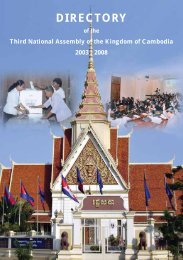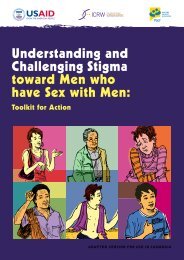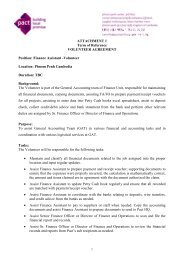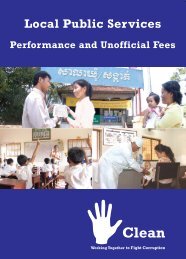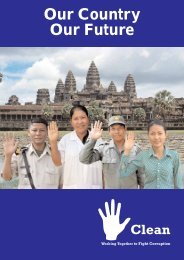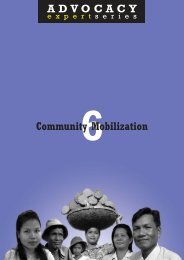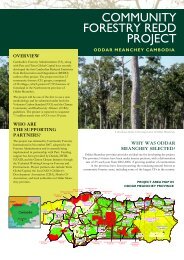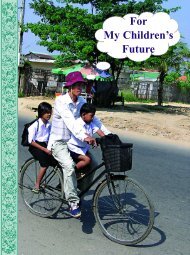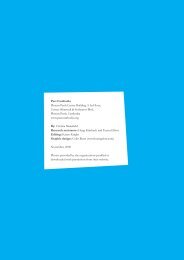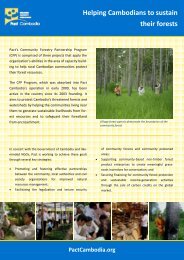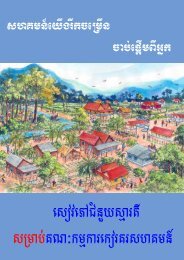Advocacy in Cambodia: Increasing Democratic ... - Pact Cambodia
Advocacy in Cambodia: Increasing Democratic ... - Pact Cambodia
Advocacy in Cambodia: Increasing Democratic ... - Pact Cambodia
Create successful ePaper yourself
Turn your PDF publications into a flip-book with our unique Google optimized e-Paper software.
courses for members of the media (press,<br />
magaz<strong>in</strong>es, television, and radio), where they<br />
learned about HIV/AIDS and <strong>in</strong>creased their<br />
ability to write <strong>in</strong>formed articles on the subject.<br />
In addition to build<strong>in</strong>g journalists’ skills, the<br />
workshops served to forge better relations<br />
between NGOs and the media, which is important<br />
for better publiciz<strong>in</strong>g the problem of HIV/AIDS.<br />
HACC plans to conduct another session for<br />
journalists <strong>in</strong> 2002.<br />
HACC has prov<strong>in</strong>cial and nationwide<br />
networks and cont<strong>in</strong>ues to build on these<br />
networks. Due to the lack of a coord<strong>in</strong>ator and a<br />
delay <strong>in</strong> fund<strong>in</strong>g disbursement from a donor,<br />
HACC has had limited success l<strong>in</strong>k<strong>in</strong>g with<br />
regional and global networks to date. HACC is<br />
plann<strong>in</strong>g three prov<strong>in</strong>cial<br />
meet<strong>in</strong>gs <strong>in</strong> 2002, the first to<br />
be held <strong>in</strong> Battambang <strong>in</strong><br />
June. HACC plans to mobilize<br />
multiple community-based<br />
organizations to participate <strong>in</strong><br />
the coord<strong>in</strong>ation process <strong>in</strong> an<br />
attempt at expand<strong>in</strong>g the<br />
current network and its<br />
facilities to the more remote<br />
prov<strong>in</strong>ces of <strong>Cambodia</strong>.<br />
Managers of the network<br />
contend that work<strong>in</strong>g through<br />
networks presents<br />
advantages<br />
and<br />
disadvantages. The advantage<br />
is that through networks NGOs can have a strong<br />
voice, which facilitates lobby<strong>in</strong>g the government<br />
and donors to change their policies. The challenge<br />
of work<strong>in</strong>g with a large number of organizations<br />
it that it takes time and energy to help the agencies<br />
come to a common understand<strong>in</strong>g and reach<br />
consensus on advocacy objectives because each<br />
has its own strategies and criteria to follow.<br />
NGO advocacy concerns <strong>in</strong>clude:<br />
• Patients’ access to treatment, <strong>in</strong>clud<strong>in</strong>g<br />
anti-retroviral treatment;<br />
• Patient care, as the government does not<br />
have a law or policy on the treatment of<br />
HIV/AIDS patients;<br />
• Blood test<strong>in</strong>g; and<br />
• Participation of all government m<strong>in</strong>istries<br />
<strong>in</strong> the HIV awareness rais<strong>in</strong>g effort.<br />
A number of factors facilitate HIV/AIDS<br />
advocacy. First, HIV is a global problem and<br />
<strong>Cambodia</strong> benefits from lessons learned and<br />
models developed <strong>in</strong> other countries. Second,<br />
there are many NGOs work<strong>in</strong>g <strong>in</strong> the HIV/AIDS<br />
field <strong>in</strong> <strong>Cambodia</strong> and significant human and<br />
The role of the <strong>Cambodia</strong>n<br />
Positive Network (CPN+),<br />
which is staffed by HIV+<br />
<strong>in</strong>dividuals, is to br<strong>in</strong>g<br />
support groups and AIDS<br />
service organizations<br />
together so that they can<br />
share <strong>in</strong>formation.<br />
f<strong>in</strong>ancial resources are be<strong>in</strong>g channeled to this<br />
sector. Though at present there are many people<br />
and agencies will<strong>in</strong>g to participate <strong>in</strong> campaigns<br />
however, there are still few actors able to design<br />
and lead campaign strategies.<br />
Empower<strong>in</strong>g People Liv<strong>in</strong>g with AIDS<br />
A donor assessment conducted <strong>in</strong> 2001<br />
revealed that HIV+ people were not be<strong>in</strong>g <strong>in</strong>cluded<br />
<strong>in</strong> the policy design process. In addition, the<br />
assessment identified a need for capacity build<strong>in</strong>g<br />
of policy-makers and the provision of good<br />
<strong>in</strong>formation and evidence to be used <strong>in</strong> policy<br />
formation. As a result of the assessment, <strong>in</strong> July<br />
2001, the International HIV/AIDS Alliance global<br />
<strong>in</strong>itiative supported creation of a <strong>Cambodia</strong>n<br />
Positive Network (CPN+)<br />
through the Khmer HIV/<br />
AIDS NGO Alliance<br />
(KHANA). The purpose of the<br />
network is to enable people<br />
liv<strong>in</strong>g with AIDS to<br />
participate <strong>in</strong> policy dialogue.<br />
The role of the organization,<br />
which is staffed by HIV+<br />
<strong>in</strong>dividuals, is to br<strong>in</strong>g<br />
support groups and AIDS<br />
service organizations together<br />
so that they can share<br />
<strong>in</strong>formation. Approximately<br />
twenty organizations are <strong>in</strong><br />
regular contact with the network.<br />
The creation of mean<strong>in</strong>gful participation<br />
requires mentor<strong>in</strong>g and the develop<strong>in</strong>g of<br />
professional skills. The POLICY Project currently<br />
provides mentor<strong>in</strong>g and technical assistance to<br />
CPN+. Capacity build<strong>in</strong>g <strong>in</strong>cludes support<strong>in</strong>g<br />
CPN+ staff to participate <strong>in</strong> global conferences,<br />
regional HIV forums, and regular national<br />
meet<strong>in</strong>gs so that <strong>Cambodia</strong>n people liv<strong>in</strong>g with<br />
AIDS (PWAs) can participate mean<strong>in</strong>gfully and<br />
actively <strong>in</strong> national, regional, and global<br />
movements. English language tra<strong>in</strong><strong>in</strong>g has also<br />
been important, as language is a barrier to<br />
participation for people liv<strong>in</strong>g with AIDS <strong>in</strong> policy<br />
formulation. The network was recently <strong>in</strong>vited to<br />
address safety and security organizations at an<br />
ASEAN human security network session <strong>in</strong><br />
Bangkok.<br />
The POLICY Project has also developed an<br />
HIV advocacy curriculum for members of the<br />
CPN+ network, <strong>in</strong> addition to target<strong>in</strong>g and<br />
tra<strong>in</strong><strong>in</strong>g those people who are advocat<strong>in</strong>g for and<br />
on behalf of people liv<strong>in</strong>g with AIDS. The central<br />
pr<strong>in</strong>ciple of the POLICY Project’s strategy is the<br />
<strong>in</strong>clusion of people liv<strong>in</strong>g with AIDS <strong>in</strong> policy<br />
formulation, a pr<strong>in</strong>ciple which is often not<br />
operationalized <strong>in</strong> <strong>Cambodia</strong>, or only to some<br />
Case Studies<br />
89



